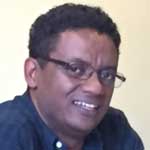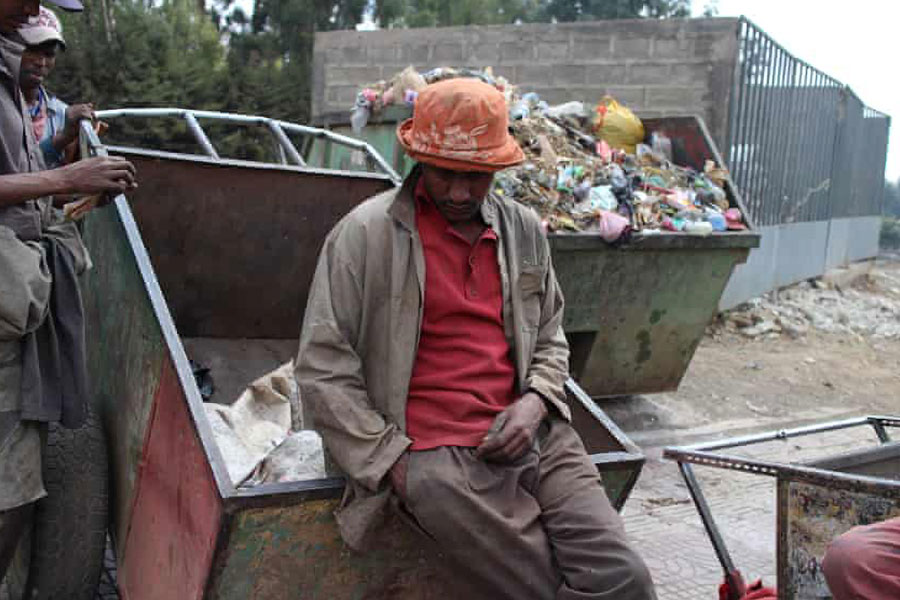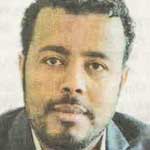
Films Review | May 18,2019
Jan 18 , 2020
By Dawit Wondimagegn
The sense of mission drive among doctors, educators and health care providers has been all but lost. If anything, the only mission it drives seems to be the mission of self-importance, writes Dawit Wondimagegn (MD) (dawitwondimagegn@gmail.com), associate professor of psychiatry at Addis Abeba University and chief executive director of Tikur Anbessa Hospital. These are his personal views.
In this age of disruption, we can no longer expect things to be the way they are supposed to be. The norms and values of society have changed and continue to be fluid. Nothing holds. What we knew as truth for a long time is evaporating in front of our eyes. Reality is asserting itself as the process of continuous disintegration. In all of this progress, one phenomenon is engulfing the professions without notice: the process of becoming "too important".
Gone are days when the purpose of education was evident. We used to have no questions when we all thought and taught the purpose of education as behavioural change that leads to improvements in the conditions of life for the many, and while at it to push the frontiers of knowledge further.
The professions used to be the unmistakable symbols and concretizations of these ideals. Now we are witnessing the process of education turning into a journey of "becoming": the journey of becoming, too important to do the basics; the success of becoming, too important to serve; and the travel to a status where we are too important to care.
Most physicians go into medicine with a mission, committed to helping people. We are grateful for the opportunity to care for others as only a few in human history are endowed with such a prospect. We are proud of our ability to diagnose and treat as that is the marker of our uniqueness. Our patients inspire us as they demonstrate the limits of human resilience, and we are thankful for the trust they put in us, because without that what we know ceases to matter.
We spend our days exploring the mysteries of the human body, immersed in the delicate and intricate recesses of our nature. We learn and gain competence in deciphering medical secrets by looking into the eye, listening to the heart and palpating organs, cutting open a body with a scalpel and asking about the innermost held thoughts a person may have. In doing these things, we are afforded one of the greatest privileges given to any person in society – it is both awesome and an awesome responsibility in every sense of the word.
Medicine has a romance to it too. It has that magic to cajole the romantic out from the most hardened of hearts. We all can vividly imagine when we received the news of our medical school acceptance - for me, it was Addis Zemen, the state Amharic daily - when the Dean came to speak to our class on the first day of medical school. Or the first time we heard a heartbeat through a stethoscope, scrubbed into an OR, delivered a baby, comforted a sick patient, helped someone heal and helped someone die with respect. Every detail is stamped in our memory like that mesmerizing experience of falling in love.
Most educators, as well, go into education with the same spirit, committed to nurturing the development of the young. We are grateful for the opportunity to teach the younger generation as that is the surest way to outlive our mortality. We are proud of our ability to explore, understand and pass on knowledge as that too is the marker of our uniqueness.
Our students inspire us as they demonstrate the plasticity of their growth in contrast to our rigidities, and we are thankful for the trust they put in us, because we know that it is only a matter of time before they outgrow us in all domains.
We spend our days exploring the ambiguities of knowledge immersed in the corpses of documents and works from the great thinkers of time. We learn and gain competence in decoding knowledge by looking into books that are pinholes into the body of accumulated wisdom, listening to the professor who had gone the length just to come back to question it and through touching, testing, researching and exploring that one bit of knowledge to unpack its weaknesses.
In doing these things, we are afforded again one of the greatest privileges given to any person in society – it is both awesome and an awesome responsibility in every sense of the word.
Education has a romance to it too. It has that mystic tendency to excite just for the sake of knowing something and sharing it with someone. We all know how ambivalent it felt walking into that first lecture.
Do I know enough? Can I deliver it? Am I going to be discovered for the fake that I am? Am I good enough? Educated enough? Have I read enough? Matured enough?
We also remember that first question from a student. The fear of judgment and then all the surprise, that students are listening, that they actually think I know something, that they come to me for advice, that they ask me for guidance and that they think I am great.
Every detail is stamped in our memory again like that mesmerizing experience of falling in love.
This indeed is quite a romantic picture of two noble professions, which is in stark contrast to what we are seeing among doctors, educators and health care providers. That sense of mission drive is nothing but lost. If anything, the only mission it drives seems to be the mission of self-importance.
It appears to the eye that as people move through the ranks of education, they find it harder and harder to be relevant to society. There seems to be a role reversal in that there is an expectation on society that it needs to serve its educated members instead of the other way around.
Do professionals have a different moral responsibility than the average citizen to serve society?
The answer used to be a given but no more, so we need to ask this tongue in cheek question. In a way, it indicates where we are as a society, a moment where we have to reflect on all assumptions that we take for granted.
We are living at a time where professionals, especially those in the helping professions, that is health care, education, and law enforcement, are virtually suffering from an epidemic of emotional and physical exhaustion, cynicism, depression and compassion fatigue. Professionals and their professions are suffering. There is no doubt there.
There are so many reasons why we are where we are. It starts from the fact that there is hardly a consensus as to how one is to be a professional. It is assumed that we all know what it means.
But workers need to understand what is meant by professionalism and develop the necessary skills to maintain professionalism. We are far from attaining the very basic tenets of professionalism - communication, teamwork and content expertise. An anti-elitist education system of late, while having merit and justification, may nonetheless have over-emphasised content expertise leading to a catastrophic decline in nurturing the values of professionalism.
There are also systemic barriers to professionalism: excessive workload and its associated fatigue, inadequate human power, lack of regular review of work processes and lack of standardised protocols for communication. We can also add to this obscurity of roles and responsibilities between different professional groups at the workplace as well as the lifestyle considerations that lead to an imbalance in the work-life equilibrium.
However, the question of remuneration claims the centre stage of all the systemic barriers to professionalism as individual behavior is typically derived from incentives. Whether the incentive is monetary is a source of debate among professionals.
The individual’s desire to be professional should not be questioned, but challenges that conflict with the individual’s desire to be professional may arise from the workplace. The most widely cited scenario is professionals struggling to make ends meet.
But do professionals have a different moral responsibility than the average citizen to serve society, while they are struggling to meet their own basic needs?
This is no more a tongue in cheek question, but my aim here is not to answer that.
The systemic barriers mean that we are not just expected to be professional, but we also need to have professional resilience. This means staying professional despite the overwhelming challenges, which is our ultimate struggle for the foreseeable future. As some challenges are solved and others linger on, we are faced with the unavoidable reality that without a solid professional resilience, both professionals and professions are heading down to the dumps.
The additional skills for professional resilience require higher order capacities in self-awareness, self-control, situational awareness and, as we are witnessing now, crisis communication skills. As we all can attest to in the current socio-political discourse, basic communication skills have become a challenge let alone crisis ones.
Given that this is the condition we are in, how do we respond, adapt, adjust or change to fit our existential reality?
There is indeed a way. As professionals find themselves in an increasingly demanding environment, they take it upon themselves to find and be part of the solution; however, finding solutions takes more time and needs acceptance. It needs time, because most of our problems are developmental, and we have no control over that.
The lack of control means a need for acceptance, which entails that we have to live with some difficulties while believing that the difficulties we are facing will go away but we may or may not be there to benefit from it. This requires a considerable leap of faith. Short of that: a flight.
Professionals have been in the "flight mode" for so long. The flight through brain drain is one example where people take the escape root directly. As this meditation is about people who stayed, it forces us to explore another experiential phenomenon that permits the flight without the need to take it concretely.
One concept that has the potential to explain our state of professionalism could be "inner emigration" a phenomenon where people find their experience essentially disconnected from their surroundings. Overwhelming challenges may have forced people to flee into their inner self. This creates a scenario where one feels completely dissociated from its environment and leads to an almost autistic existence where only the self matters.
In this premise, our argument that education is becoming the process of becoming too important falls in valid terrain. This in itself is a problem we need to address but it is even more of a problem when one considers that professionalism is learned from the hidden curriculum. Our complaint that the younger generation is becoming more and more narcissistic, self-involved, self-interested and defiant will continue to fall on deaf ears as long as we keep teaching them the same.
PUBLISHED ON
Jan 18,2020 [ VOL
20 , NO
1029]


Films Review | May 18,2019

Commentaries | Sep 18,2021

Editorial | Nov 07,2020

Fineline | Mar 30,2019

View From Arada | Oct 09,2021

Commentaries | Aug 10,2019

Addis Fortune | Oct 30,2022

Verbatim | Nov 16,2019

Life Matters | Jun 18,2022

Viewpoints | Dec 04,2020

My Opinion | 131772 Views | Aug 14,2021

My Opinion | 128156 Views | Aug 21,2021

My Opinion | 126101 Views | Sep 10,2021

My Opinion | 123723 Views | Aug 07,2021

Dec 22 , 2024 . By TIZITA SHEWAFERAW
Charged with transforming colossal state-owned enterprises into modern and competitiv...

Aug 18 , 2024 . By AKSAH ITALO
Although predictable Yonas Zerihun's job in the ride-hailing service is not immune to...

Jul 28 , 2024 . By TIZITA SHEWAFERAW
Unhabitual, perhaps too many, Samuel Gebreyohannes, 38, used to occasionally enjoy a couple of beers at breakfast. However, he recently swit...

Jul 13 , 2024 . By AKSAH ITALO
Investors who rely on tractors, trucks, and field vehicles for commuting, transporting commodities, and f...

Jul 5 , 2025
Six years ago, Ethiopia was the darling of international liberal commentators. A year...

Jun 28 , 2025
Meseret Damtie, the assertive auditor general, has never been shy about naming names...

Jun 21 , 2025
A well-worn adage says, “Budget is not destiny, but it is direction.” Examining t...

Jun 14 , 2025
Yet again, the Horn of Africa is bracing for trouble. A region already frayed by wars...

Jul 6 , 2025 . By BEZAWIT HULUAGER
The federal legislature gave Prime Minister Abiy Ahmed (PhD) what he wanted: a 1.9 tr...

Jul 6 , 2025 . By YITBAREK GETACHEW
In a city rising skyward at breakneck speed, a reckoning has arrived. Authorities in...

Jul 6 , 2025 . By NAHOM AYELE
A landmark directive from the Ministry of Finance signals a paradigm shift in the cou...

Jul 6 , 2025 . By NAHOM AYELE
Awash Bank has announced plans to establish a dedicated investment banking subsidiary...